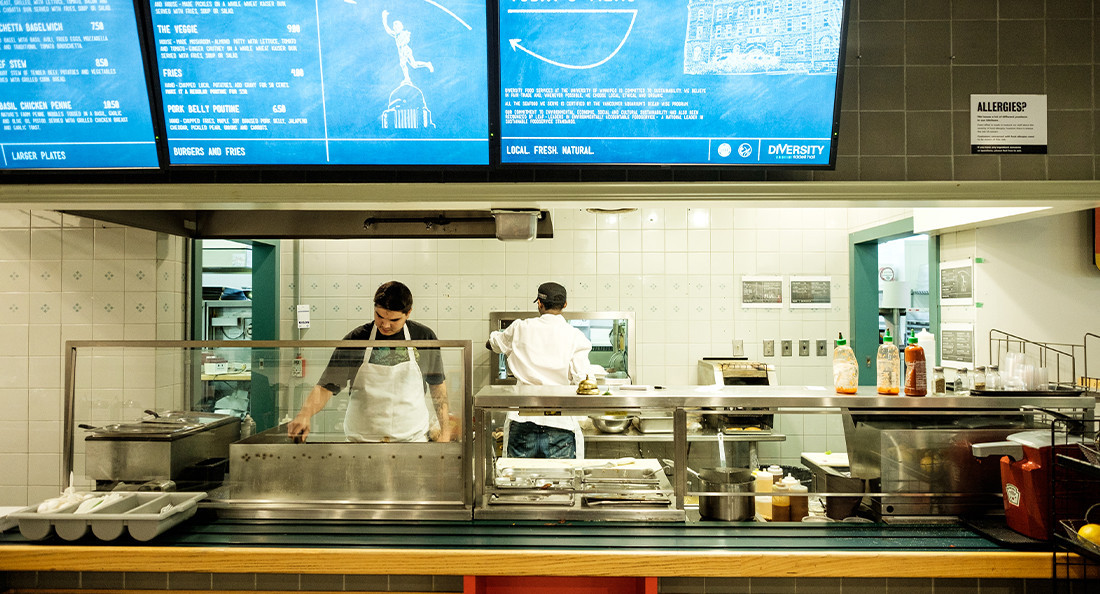Diversity Foods and COVID-19
The life of a social enterprise during a pandemic
Diversity Food Services, which is the main food provider on the University of Winnipeg (U of W) campus, is no stranger to innovation and change. As a social enterprise that emphasizes sustainability, it has earned recognition as the most sustainable campus food provider in North America by the Association for the Advancement of Sustainability in Higher Education and by LEAF as Canada’s greenest restaurant.
Now, because the campus and its cherished dining spaces have been empty for the past year, Diversity has had to innovate yet again – while dealing with the immense challenges facing the food industry during a pandemic.
Diversity’s chief operating officer Ian Vickers recalls the difficult first few weeks of the pandemic last March.
“Within the first few days, when the university massively reduced who was going to be on campus, we had to massively reduce our employees,” he says, noting that Diversity is a small social enterprise with slim profit margins.
Vickers describes the painful process of laying off 86 employees. “That was just gut-wrenching for all of us,” he says.
It was especially difficult since Diversity employs individuals belonging to traditionally disadvantaged groups. In fact, according to their website, 78 per cent of their 2017 employees belonged to one of the following groups: individuals with “disabilities, new immigrants/refugees, Indigenous peoples, individuals residing in inner-city, low-income households, people exiting the justice system, members of the LGBTQQIP2SAA* community and food-insecure students.”
For the furloughed staff, there was one silver lining.
“We worked with our benefits provider to allow those people to keep their benefits while they were laid off,” Vickers says. Furthermore, Diversity helped its employees apply for the Canada Emergency Response Benefit.
Vickers credits the U of W community and the U of W Students’ Association for being ardent supporters of this service, especially in its early days. In addition to offering grocery delivery, Diversity provides a COVID-19 catering service, with meals prepared under strict safety protocols.
Jessica Young, Diversity’s executive chef, who has been with the company throughout the pandemic, remembers the chaos of the early days of COVID-19.
“We were pivoting daily as new information on sanitation was coming in,” she says. “That whole two-week time span that it took for us to shut down all operations felt like it had enough ‘stuff’ to fill months.”
She also mentions the pandemic’s emotional toll. “My job, for me, is about people, our community and providing meaningful employment,” she says. “For all of that to be wiped out in the span of two weeks was devastating.”
With the closure of the U of W campus, Diversity had to rapidly adapt its business model.
“We were the first company in Winnipeg to make that fast pivot and open our website-based grocery store,” Vickers says. This service started on March 15, 2020, a mere four days after the World Health Organization declared a pandemic and three days after Manitoba’s first presumptive COVID-19 case.
“The upside of not being a huge multinational is that we can pivot a lot faster,” Vickers says.
The grocery delivery service, which is still operational, features everything from pantry staples to prepared meals and local products.
Despite the first few weeks and months being very difficult, Young highlights some of the successful initiatives which occurred throughout 2020.
“We got a food truck up and running last summer,” she says. The truck was stationed at different locations throughout Winnipeg. They also participated in local farmers’ markets.
U of W-focused services have also been in the works.
“Over the summer months, I spent time and worked with a company to develop an app so that students who are living in residence are able to order food for delivery to any office or classroom on campus,” Vickers says. He adds that Diversity hopes to use this technology when the U of W campus reopens to all.
A big challenge for Diversity over the past year has been balancing their mandate for sustainability with pandemic safety protocols. For instance, they stopped using reusable plates and utensils due to the potential for them being vectors for the virus.
“When you think in terms of the span of a few weeks to a couple of months, you can sort of put sustainability on the shelf,” Vickers says.
“I am very pro-bottle-refill station and against bottled water, and yet, we had to ... sell bottled water,” he says, “due to Manitoba Public Health closing all the water-refill stations.”
With the eventual reopening of campus, Vickers believes such protocols may persist and result in a shift of restaurant and cafeteria culture.
“I think we are going to see more people who do want to order on an app, walk over to a pickup station, pick up their food and take it somewhere else,” he says.
“We also have to give people a safe space to eat in so that they can have some socializing, because ... mental health is important, too,” Vickers says.
As of press time, the U of W has yet to announce its plan for the fall term, which commences in September. Diversity, however, is currently planning for three different capacity scenarios.
“The benefit of retrospect is that we’re emerging informed,” Young says. “We have an opportunity to break down broken systems and put them back together.” Young believes this applies both to the world and to Diversity.
“We’ve sat down and asked: ‘do our own personal visions and purpose align with the company’s?’” Young says.
“Ultimately, the people who work for us should believe in us,” she adds.
Customers can place a grocery order online at diversityfoodservices.com/online-ordering or phone 204-291-8561.
Published in Volume 75, Number 22 of The Uniter (March 18, 2021)







